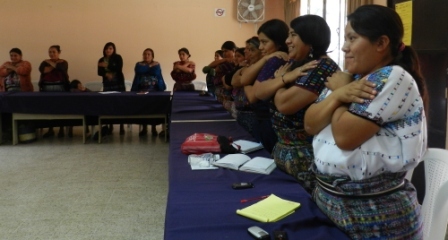Guatemala : Women commit to agro-ecology


(9/19/2013) Joined in the National Coordinated Widows of Guatemala (CONAVIGUA), the indigenous women who lost their husbands and family members during the 36 years of internal armed conflict that devastated Guatemala between 1960 and 1996 decided a few years ago to devote themselves to the protection of land and growing organic products.
“The plants, herbs and other crops such as corn and beans are important in the lives of women,” said María Isabel Soc, member of CONAVIGUA and of the Women’s Commission of the international organization La Vía Campesina. “We are corn and we cannot eat another type of food that is not ours.”
“Many years ago began the process of training and educating women from different regions of the country so that they can put in practice their knowledge within their relationship with Mother Earth, the importance of food sovereignty, taking advantage of the resources they have in their communities and having access to a healthy nutrition,” she added.
In the Alta Verapaz region, in the north of the country, the women of various rural communities have decided to grow their crops using only organic fertilizer and homemade insecticide.
“Today they grow a variety of vegetables and medicinal plans,” said Marieta Tista de León, member of one of the communities of Alta Verapaz. “Women have improved the economies of their families and now they don’t depend on a place to purchase their food but they are the ones who provide healthy and nutrient-rich food to nearby families.”
Lucía Quilá, leader of CONAVIGUA, said that farming allows women to feed their families and have a surplus to satisfy other needs. Many of them began with small plots and now they provide food to their communities.
However, they find it hard accessing the market to sell their products and they have to compete with transgenic products that have invaded their communities.
CONAVIGUA turned 25 on Sept. 12. Indigenous organizations such as the Maya Waqib’Kej National Coordination and Convergence highlighted “the daily struggle [of CONAVIGUA] in strengthening leadership and transforming the lives of Maya women in Guatemala.”
Among the CONAVIGUA projects that have empowered indigenous women are literacy programs, mental and physical health programs, but especially those projects that “help the family economy, seeking food sovereignty, making use of the natural resource conservation living in harmony with Mother Nature”, saluted Waqib’Kej.
Published byLatinamerica Press
